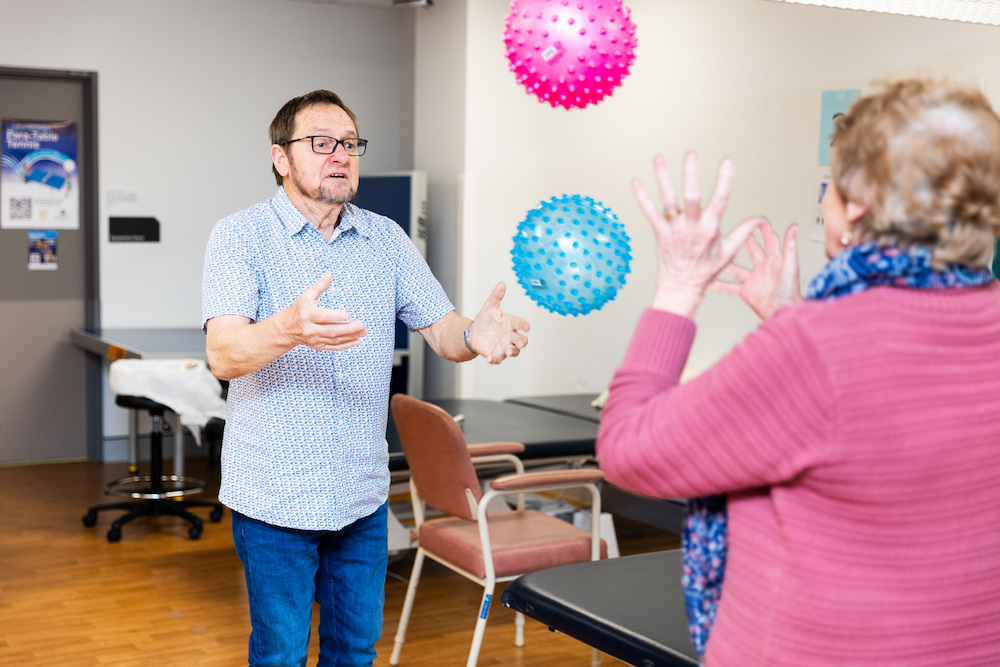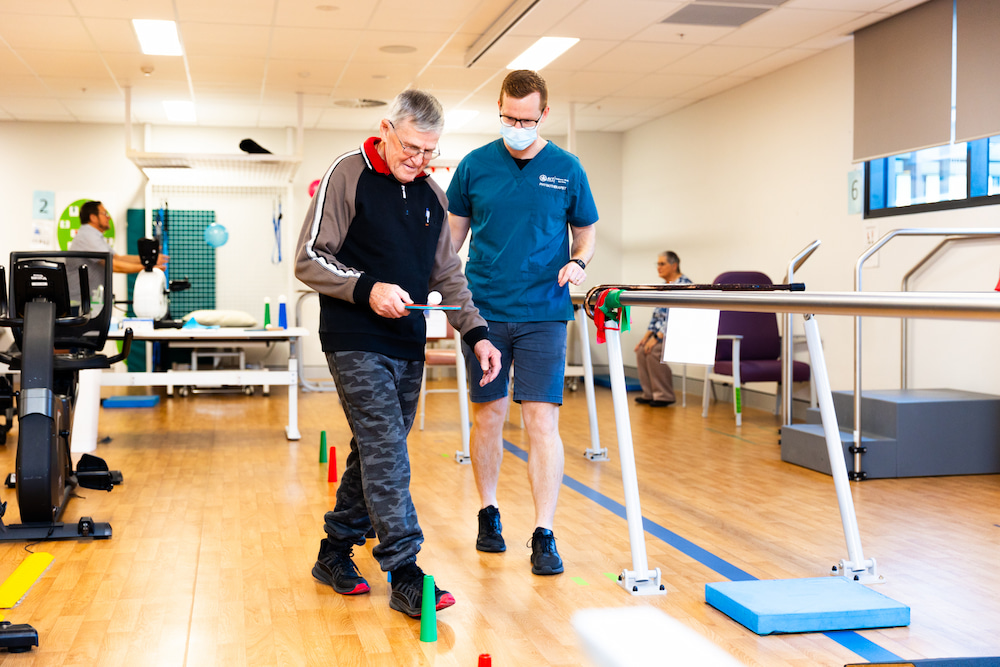In the University of Canberra Hospital’s gym, Albert Green OAM walks backwards through an obstacle course, balancing a ping-pong ball on a racquet. William Simpkin and his wife Anne toss two balls back and forth, simultaneously throwing one and catching the other.
Messrs Green and Simpkin both have dementia. They are taking part in SPICE (short for Sustainable Personalised Interventions for Cognition, Care and Engagement), an active therapeutic intervention designed to help people with dementia remain living independently at home. More than two-thirds of Canberrans with dementia still live in the community.
“It’s really a program that’s been put together to help them to remain engaged in activities that are important for them, to help keep them safe, and to help build capacity for carers to care for the person with dementia,” said Assistant Professor Nathan D’Cunha, a University of Canberra expert on non-pharmacological interventions for people with dementia and carers.
The 12-week program combines cognitive stimulation therapy (activities that stimulate the mind, and improve memory, reasoning, and language) and physical activity.
Cognitive stimulation therapy, Dr D’Cunha says, is one of the most evidence-based non-pharmacological interventions for people with dementia: “[It] really helps people to work on their communication skills, engage in current affairs and things that are meaningful and interesting to them.” But uptake in Australia has been limited until now.
SPICE also educates caregivers and helps them build better skills for providing care. Home-based occupational therapy is designed to handle care challenges, and personalised advice on diet and nutrition is also given.
Dr D’Cunha is only aware of one other program in all Australia whose intensity and length are comparable to SPICE.
Neither Mr Green nor Mr Simpkin can speak highly enough of the program.
“I was going nowhere and doing nothing,” Mr Green said. “It seemed like I was going backwards rather than forwards, but now I’m racing ahead… I’ve got more interests and I’ve got more people I know and am friends with. It’s all because of the course.”
Mr Simpkin said that a lot of people with dementia think: ‘We’ve lost; we’ll just sit down and read the paper.’
“But this has been an opening into something that we weren’t really thinking about… There’s nothing else like it for us at this time of our lives. … We would have been lost without them, particularly the people who were looking after us; they’re just wonderful for us.”

SPICE began at the UC Hospital in September 2022, and is run by an occupational therapist, a physiotherapist, a social worker, a psychologist, and an allied health assistant.
The program was designed by Michelle Bennett, then-manager of the Brindabella Day and Ambulatory Rehabilitation Service, and her team at Canberra Health Services.
“It was set up because we identified that there was a gap in intervention services for people who have dementia, particularly in the ACT,” Ms Bennett said.
“A lot of people do need some extra allied health intervention to remain in the community for as long as possible to delay entry into residential aged care and also to reduce the risk of hospitalisation,” Dr D’Cunha said.
“There’s a lot of community services for people with dementia, such as with Dementia Australia, but nothing that really gets that allied health intervention to people when they need it after a dementia diagnosis.”
“We know,” Ms Bennett said, “that there are a number of programs that are well evidenced in the literature that provide good benefits for people with dementia, in maximising their quality of life, and their health and wellbeing and managing care challenges,” Ms Bennett said.
For instance, Dr D’Cunha said, different components of SPICE reduce healthcare use, keep people out of hospital, and reduce the risk of falls.
“So, what we wondered,” Ms Bennett continued, “was, even though all of those have been proven to be effective individually, what would be the effect of these if we put them all together into one program? Some of the benefits we hypothesised where that it would be easier for people with dementia and their carers to be able to access all of those in one area, rather than having to look for those through different providers in the ACT.”
So far, three groups have taken part in a pilot program, evaluated by the University of Canberra; a fourth group starts today. UC reports that participants’ quality of life and cognitive abilities have improved, they perform better in physical tests, and their dementia-related behavioural symptoms have reduced.
“We had some feedback the other day that it is really beneficial for people to be able to access all of the interventions they need in one program,” Ms Bennett said.
In general, Dr D’Cunha said, participants are more engaged in the community, have more confidence, and are more comfortable around other people.
“A lot of our participants have reported improving their confidence from being able to do that program. That has actually had side effects of enabling them to then have that ability to go out in the community, and do other things as well, because they know that they are not alone in their dementia diagnosis.”
Another case: “One participant was really having a lot of problems with her gait and balance, but by coming to the program and working with the physio, she was able to correct some of that and look at where she was walking. We’ve seen a couple of examples like that.
“We really think that if they can maintain that for a longer period of time, that’s really going to have a lot of benefits for them, and really help them to get out of the home and do things that they want to do.”
Mr Green said the program has had “a tenfold advantage”.
“The course is fantastic. It helped my dementia. I’m remembering a bit more than I was before… They gave me [exercises] that were even harder than the others, because they could see I was doing [them] fairly easily. I was getting very tired, and I didn’t have the same sort of energy that I have at the moment; the course really helped me get back into the swing again.”
Carers also report psychological benefits, being better able to manage caregiving challenges at home and to take part in meaningful activities with the person with dementia.
“We know how important it is for unpaid carers to be able to help the person with dementia continue to live at home,” Ms Bennett said.
“We have provided that, and we are seeing lots of positive outcomes from carers… They’ve been able to practically apply some of the strategies they have learnt … and they’re noticing that that has led to positive outcomes in their ability to care for the person at home and also to maximise the person with dementia’s ability to live independently.”
The program has also led to firm friendships and a peer support network. After the program has finished, Dr D’Cunha said, the groups talk to each other on WhatsApp, meet at clubs and coffee shops, and visit each other. When one carer fell ill, the other carers and people with dementia supported him, “which I was just blown away by”.
“I’ve made a lot of new friends, which is really wonderful,” Mr Green said. “At my age, making new friends is slightly difficult!
“We decided we would stick together, and always meet and talk. We go with Anne and Will all the time to different things. We’re going on a train journey shortly. It’s improved my life, and made it not so lonely as it was.”
Canberra Health Services will start a SPICE program on the southside soon, Ms Bennett said.
“People can have a choice as to where they want to come … [and they] will be able to establish some of those local supports in their very local community.”
They also intend to start a program for people who cannot meet all the requirements for SPICE, such as access to a regular carer.
Other states and countries are interested in SPICE and its results.
“We’re hoping to see if SPICE can go outside the ACT and benefit as many people as possible,” Dr D’Cunha said.
SPICE is funded by the ACT Government through Canberra Health Services, and is free for participants. Anyone interested in accessing the SPICE project can contact Megan Sullivan at [email protected].



